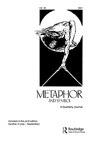精神分裂症患者隐喻的产生——一个个案分析
IF 3.3
3区 文学
0 LANGUAGE & LINGUISTICS
引用次数: 2
摘要
摘要有充分的证据表明,精神分裂症患者表现出形象语言理解障碍。他们的隐喻创作并没有引起学术界的广泛关注。因此,我们研究了精神分裂症患者与非精神病对照组的隐喻产生。对控制言语和半控制言语分别从语言、概念和语篇三个层面进行了定性案例分析。使用基于临床语言障碍评定量表和图形刺激的转录访谈获得平衡和可比较的言语材料。转录本被注释为语言隐喻以及概念隐喻的类型和水平。此外,还进行了隐喻引导的语篇分析。对目标组和对照组的参数进行分析和比较。我们发现,患者言语中语言隐喻的百分比与对照组言语中语言比喻的百分比显著相似。我们在初级或复杂隐喻、一般或特定隐喻、新颖或传统隐喻、转喻、反讽或夸张的产生方面没有发现任何显著的障碍,在话语情节的隐喻框架中也没有发现任何明显的障碍。考虑到临床上精神分裂症的异质性,我们的定性结果要求对该主题进行定量检查和额外的审查。本文章由计算机程序翻译,如有差异,请以英文原文为准。
Metaphor Production by Patients with Schizophrenia – A Case Analysis
ABSTRACT It is well evidenced that patients with schizophrenia demonstrate impairments of figurative language comprehension. Their metaphor production has not attracted nearly as much scholarly attention. We, therefore, studied metaphor production in patients with schizophrenia as compared to non-psychiatric controls. Qualitative case analysis on three levels (linguistic, conceptual, and discourse) was performed on controlled and semi-controlled speech. Balanced and comparable speech materials were obtained using transcribed interviews based on the Clinical Language Disorder Rating Scale and on pictorial stimuli. Transcriptions were annotated for linguistic metaphors and for types and levels of conceptual metaphors. Additionally, a metaphor-led discourse analysis was performed. Target- and control-group parameters were analyzed and compared. We found that the percentage of linguistic metaphors in the patients’ speech was remarkably similar to the percentage of linguistic metaphors in the controls’ speech. We did not find any significant impairment in the production of primary or complex metaphors, general or specific metaphors, novel or conventional metaphors, metonymy, irony, or hyperbole, nor in the metaphor framing of discourse episodes̶, the production of figurative language appears intact in first-episode schizophrenia. Having in mind how clinically heterogeneous schizophrenia is, our qualitative results call for quantitative examination and additional scrutiny of the topic.
求助全文
通过发布文献求助,成功后即可免费获取论文全文。
去求助
来源期刊

Metaphor and Symbol
Multiple-
CiteScore
2.90
自引率
0.00%
发文量
23
期刊介绍:
Metaphor and Symbol: A Quarterly Journal is an innovative, multidisciplinary journal dedicated to the study of metaphor and other figurative devices in language (e.g., metonymy, irony) and other expressive forms (e.g., gesture and bodily actions, artworks, music, multimodal media). The journal is interested in original, empirical, and theoretical research that incorporates psychological experimental studies, linguistic and corpus linguistic studies, cross-cultural/linguistic comparisons, computational modeling, philosophical analyzes, and literary/artistic interpretations. A common theme connecting published work in the journal is the examination of the interface of figurative language and expression with cognitive, bodily, and cultural experience; hence, the journal''s international editorial board is composed of scholars and experts in the fields of psychology, linguistics, philosophy, computer science, literature, and media studies.
 求助内容:
求助内容: 应助结果提醒方式:
应助结果提醒方式:


